Plant structure and function -> organisms
Organisms
An organism is any individual living entity. This can be a plant, an animal, a fungus, a protist, a bacterium, or even a virus. Organisms are characterized by their ability to carry out life processes such as growth, reproduction, response to stimuli, and metabolism.
Types of Organisms
Organisms can be classified into different groups based on their characteristics:
- Plants: These are multicellular organisms that typically produce their own food through photosynthesis.
- Animals: These are multicellular organisms that consume other organisms for energy.
- Fungi: These are multicellular or unicellular organisms that obtain nutrients by decomposing other organisms.
- Protists: These are mostly unicellular organisms that can exhibit plant-like, animal-like, or fungus-like characteristics.
- Bacteria: These are unicellular organisms that have a simple cell structure and can be found in various environments.
- Viruses: These are not considered living organisms on their own, as they require a host cell to replicate.
Characteristics of Organisms
Organisms share several common characteristics that define life:
- Cells: All organisms are composed of one or more cells.
- Reproduction: Organisms can produce offspring either sexually or asexually.
- Growth and Development: Organisms undergo growth and have a defined life cycle.
- Response to Stimuli: Organisms can respond to changes in their environment.
- Homeostasis: Organisms can regulate their internal environment to maintain stability.
- Metabolism: Organisms obtain and use energy to carry out life processes.
Study Guide
To better understand organisms, consider the following key points for study:
- What are the main characteristics of living organisms?
- How are organisms classified into different groups?
- What are the distinguishing features of plants, animals, fungi, protists, bacteria, and viruses?
- How do organisms obtain and use energy to carry out life processes?
- What are the similarities and differences between asexual and sexual reproduction in organisms?
- How do organisms respond to changes in their environment?
- What is the significance of homeostasis in organisms?
By exploring these questions, you can gain a comprehensive understanding of the diverse and fascinating world of organisms.
[Organisms] Related Worksheets and Study Guides:
.◂Biology Worksheets and Study Guides High School. Plant structure and function
Worksheet/Answer key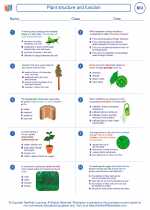 Plant structure and function
Plant structure and function  Worksheet/Answer key
Worksheet/Answer key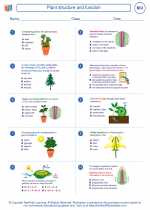 Plant structure and function
Plant structure and function  Worksheet/Answer key
Worksheet/Answer key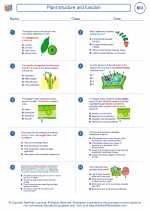 Plant structure and function
Plant structure and function  Worksheet/Answer key
Worksheet/Answer key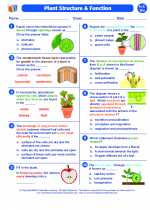 Plant structure and function
Plant structure and function  Vocabulary/Answer key
Vocabulary/Answer key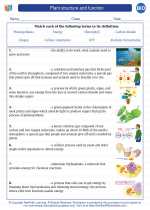 Plant structure and function
Plant structure and function  Vocabulary/Answer key
Vocabulary/Answer key Plant structure and function
Plant structure and function 

 Worksheet/Answer key
Worksheet/Answer key
 Worksheet/Answer key
Worksheet/Answer key
 Worksheet/Answer key
Worksheet/Answer key
 Vocabulary/Answer key
Vocabulary/Answer key
 Vocabulary/Answer key
Vocabulary/Answer key

The resources above cover the following skills:
Concepts of Life Science (SC1, SC2, SC3)
The student demonstrates an understanding of the structure, function, behavior, development, life cycles, and diversity of living organisms by describing the structure-function relationship